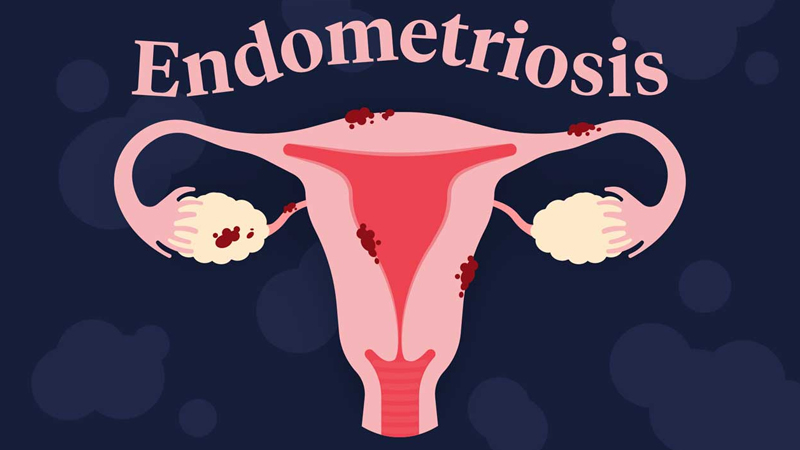
Endometriosis
Endometriosis is a chronic and often painful condition in which tissue similar to the lining inside the uterus (the endometrium) grows outside the uterus. This can lead to various symptoms and complications. Here’s an in-depth look at endometriosis:
Symptoms
The severity and nature of symptoms can vary, but common signs include:
-
Pelvic Pain
- Often associated with menstrual periods (dysmenorrhea).
- Pain can also occur during ovulation, intercourse, bowel movements, or urination.
-
Heavy Menstrual Bleeding
- Heavy or irregular bleeding during periods.
- Bleeding between periods.
-
Infertility
- Endometriosis can be associated with difficulties in getting pregnant.
-
Gastrointestinal Symptoms
- Bloating, constipation, diarrhea, and nausea, especially during menstruation.
-
Fatigue
- Chronic fatigue is common among women with endometriosis.
-
Other Symptoms
- Lower back pain, leg pain, and symptoms similar to those of irritable bowel syndrome (IBS).
Causes
The exact cause of endometriosis is not clear, but several theories include:
-
Retrograde Menstruation
- Menstrual blood flows backward through the fallopian tubes into the pelvic cavity instead of leaving the body.
-
Embryonic Cell Transformation
- Embryonic cells transform into endometrial-like cell implants during puberty.
-
Surgical Scars
- After surgeries like a hysterectomy or C-section, endometrial cells may attach to the surgical incision.
-
Immune System Disorders
- Problems with the immune system may make the body unable to recognize and destroy endometrial-like tissue outside the uterus.
-
Genetics
- Endometriosis tends to run in families, suggesting a genetic predisposition.
Diagnosis
Diagnosing endometriosis typically involves:
-
Medical History and Physical Exam
- Detailed history of symptoms and pelvic exam to check for abnormalities.
-
Imaging Tests
- Ultrasound, MRI, or CT scans can identify cysts or other abnormalities.
-
Laparoscopy
- A surgical procedure where a camera is inserted into the pelvic cavity to directly visualize and possibly biopsy endometrial tissue.
Treatment
Treatment aims to manage symptoms and improve quality of life, which may include:
-
Medications
- Pain Relief: NSAIDs like ibuprofen.
- Hormone Therapy: Birth control pills, GnRH agonists, progestin therapy, or aromatase inhibitors to reduce or eliminate menstruation.
- Fertility Medications: For those trying to conceive, medications like clomiphene or gonadotropins.
-
Surgical Options
- Conservative Surgery: Removal of endometrial growths, scar tissue, and adhesions while preserving the uterus and ovaries.
- Hysterectomy: Removal of the uterus, and possibly ovaries, in severe cases or when other treatments fail.
-
Lifestyle and Home Remedies
- Diet and Nutrition: Anti-inflammatory diet rich in fruits, vegetables, and whole grains.
- Regular Exercise: Can help manage symptoms.
- Heat Therapy: Heating pads or warm baths to relieve pelvic pain.
-
Alternative Therapies
- Acupuncture: May help reduce pain.
- Supplements: Omega-3 fatty acids, vitamin B1, and magnesium.
Complications
Endometriosis can lead to several complications, including:
-
Infertility
- About 30-40% of women with endometriosis may face difficulties conceiving.
-
Chronic Pain
- Ongoing pelvic pain can significantly impact quality of life.
-
Ovarian Cysts
- Endometriomas (chocolate cysts) may form in the ovaries.
-
Bowel and Bladder Issues
- Severe cases may involve the intestines or bladder, leading to additional complications.
Support and Resources
Living with endometriosis can be challenging, but support and resources are available:
-
Support Groups
- Connecting with others who understand the condition can provide emotional support.
-
Educational Resources
- Websites like the Endometriosis Foundation of America and Endometriosis UK offer information and resources.
-
Professional Counseling
- Therapy can help cope with the emotional and psychological impact of chronic pain and infertility.
Endometriosis is a chronic condition that requires a comprehensive approach for management, involving medical treatment, lifestyle adjustments, and emotional support. Early diagnosis and personalized care can help manage symptoms effectively and improve quality of life.
